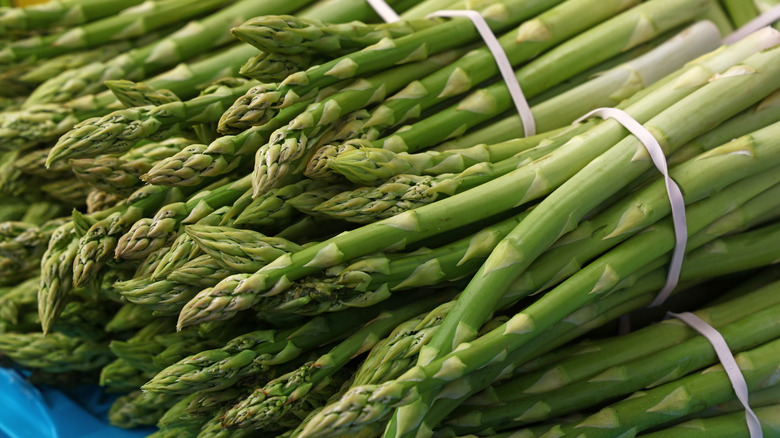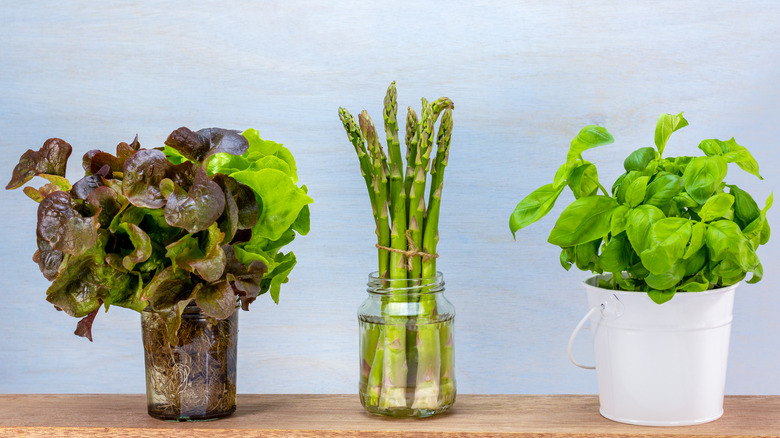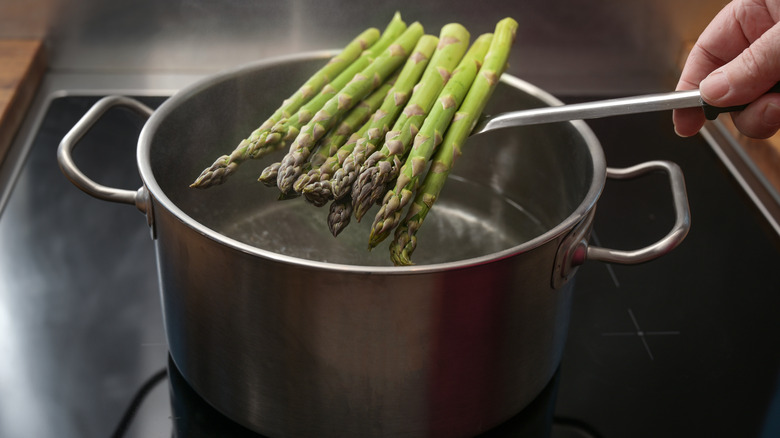The Mason Jar Hack To Extend The Life Of Your Asparagus
Asparagus may not be as popular as broccoli or green beans, but that doesn't mean it's less tasty or nutritious. But unfortunately, this vegetable is good for only three to four days — even when refrigerated. On the positive side, it's possible to keep asparagus fresh for longer with a simple hack. Store it in a Mason jar or a tall glass filled with enough water to cover the bottom ends of the spears.
A 3.5-ounce serving of asparagus contains more than 21% of the recommended daily copper intake, along with high doses of vitamin E, iron, phosphorus, manganese, zinc, and folate. This veggie is also a good source of flavonoids and other phytonutrients that may help lower cholesterol levels, suppress tumor growth, and improve heart health, notes a 2020 review published in Metabolites.
To date, researchers have identified nearly 300 types of asparagus, each offering its own benefits. For example, purple asparagus is rich in anthocyanins, while green asparagus boasts more selenium than pork and eggs, according to 2020 evidence presented in the Journal of Functional Foods. Additionally, most varieties can add a distinct flavor to salads, soups, omelets, rice dishes, pies, quiches, and everyday snacks.
Store asparagus like a flower bouquet to keep it crisp
To use a Mason jar to store fresh asparagus, first trim any tough parts that can hinder water absorption. After that, fill a clean jar with about 2 inches of water and place the asparagus spears inside it — just as you'd do with a flower bouquet. You can also loosely cover the upper part of the spears with plastic wrap to prevent them from absorbing moisture from the air.
@leeandmarias Its asapargus season, and we are so here for it! Here's how to keep it fresh in the fridge. #asparagus #producehack #freshproduce #windsorontario
Refrigerate the jar until you're ready to make bacon-wrapped asparagus, frittata con asparagi, or other delicious meals. If you plan to store the asparagus for longer, check the water level every few days and replenish the jar as needed. The water may become cloudy or murky, but you can empty the jar, rinse the asparagus, and submerge it in clean water.
Another option is to wrap the cut ends in a damp paper towel instead of using a Mason jar. Place the asparagus in a plastic bag and refrigerate it. Cooked asparagus can be stored in an airtight container and refrigerated for five to seven days. However, you should still check it every two or three days because its flavor and texture may change depending on what other ingredients you add.
Freeze asparagus for lasting freshness
Asparagus can be frozen for up to five months, but it may become mushy because of its high water content. If you go this route, you should first blanch it to preserve its flavor and texture. You'll need to bring a pot of water to a boil, add the asparagus, and then boil it for at least two minutes. Drain the asparagus spears and transfer them to a bowl filled with ice water. Next, pat them dry with a towel, place them in a single layer in airtight containers or plastic bags, and freeze them immediately.
Blanching helps retain the color of vegetables while reducing nutrient loss. This processing method works for fruits, too. The key is to freeze them as quickly as possible and remove any excess air from the bag. When you're ready to cook the asparagus, transfer it to the fridge and let it thaw overnight.
Once defrosted, use it in vegetable salads, casseroles, stews, or green smoothies. You can also grill, roast, or steam it and enjoy it as a side dish or a snack. For example, steamed asparagus tastes amazing with freshly squeezed lemon juice, olive oil, minced garlic, and salt, especially if you let the flavors meld for a few hours before serving.


